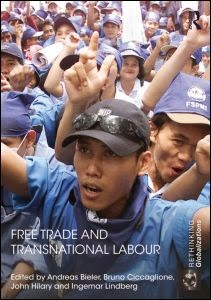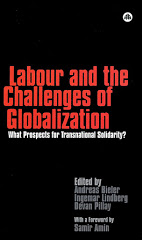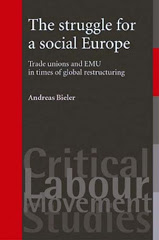Large parts of the western working class now seem to gather around right-wing
populists, demagogues and racists. They vote for reactionary and fascistoid
political parties. They helped to vote the UK out of the EU, to make Trump
president of the world's superpower number one, and they vote so massively for the
far right political parties so that they have government power in sight throughout
several of Europe's most populous countries. In this guest post, Asbjørn Wahl assesses these
developments from a labour perspective and reflects on a progress way forward.
Showing posts with label class struggle. Show all posts
Showing posts with label class struggle. Show all posts
Friday, 17 March 2017
Thursday, 5 January 2017
The Class Sentiment of the Precariat: Reflections on social movements in Portugal 2011-2013.
In 2011, analysing new and ever more widely spread practices of informal
work Guy Standing made his important intervention announcing the emergence of
the precariat as a new class-in-the-making (see The Precariat – a new class agent for transformation?). In this guest post, Florian Butollo critically engages with Standing’s claim through an examination of
social movements in Portugal between 2011 and 2013. He demonstrates that
provided we have a broader and more political understanding of class, these
movements can still be understood in class terms, providing us with a better
way of thinking about the possibilities of collective resistance against
exploitation.
Wednesday, 30 November 2016
The Future of UK-China Relations post-Brexit - China as a Hope Project
With Brexit on the horizon, the UK is
currently in search for alternative trade agreements, not only with European
countries, but also other economies around the world. The emerging market of
China plays a key role in this strategy. In this blog post, I will assess the
potential and implications of future UK – China relations.
 |
| Photo by Sergeant Paul Shaw LBIPP/MOD |
Sunday, 13 November 2016
Imperialism in the Twenty-First Century
Despite the ongoing ramifications of the
global economic crisis of 2007/2008, capitalism continues to reap super
profits. In his fascinating book Imperialism in the Twenty-First Century:
Globalization, Super-Exploitation and Capitalism’s Final Crisis (Monthly Review
Press, 2016) John Smith unravels the underlying dynamics of global capitalism. By
tracing the production of the T-shirt, the cup
of coffee, and the iPhone, he demonstrates how these generate the transfer of
enormous surplus value from countries in the Global South to transnational
corporations in the North. In this blog post, I will outline several of
the key contributions of this book and offer a number of critical reflections.
Thursday, 20 October 2016
The Struggle of organising Migrant Workers
With
precarious forms of work increasingly also emerging within the core of
industrialised countries in the global economy, the issue of how to organise
migrant workers has become an ever more pressing concern. In his talk at
Nottingham University on Tuesday, 17 October, Aziz Choudry reported on related
challenges, drawing on two of his recently co-edited books, Unfree
Labour? Struggles of Migrant and Immigrant Workers in Canada (Oakland,
CA: PM Press, 2016), together with Adrian Smith, and Just
Work? Migrant Workers’ Struggles Today (London: Pluto Press, 2015),
together with Mondli Hlatshwayo. In this blog post, I will draw out a couple of
key insights resulting from Choudry’s analysis of a large range of different
forms of migrant labour organising.
Thursday, 13 October 2016
Proposals for Alternatives to Neo-liberalism: SIGTUR's Futures Commission.
As a first step, the Futures Commission has now published the booklet Challenging Corporate Capital: Creating an Alternative to Neo-liberalism. It includes proposals for labour and tax justice, a fair trade regime, a democracy-driven, public sector transformation as well as a response to the climate crisis. In this blog post, I will provide brief overviews of the contributions as well as links to the larger versions of the papers, freely available on the website of the Rosa Luxemburg Foundation in Johannesburg/South Africa.
Monday, 12 September 2016
Towards Labour Centred Development
In
2014, Ben Selwyn published the book The Global Development Crisis (Polity, 2014), in which he critically
engages with market-led and state-led developmental models alike. Importantly,
he puts forward the novel concept of labour centred development. In this blog
post, I will discuss the main contributions of this remarkable book and explore
further the possibilities of labour centred development.
Tuesday, 16 August 2016
Super-exploitation and resistance: different forms of workers protests in China.
China is
frequently considered to be an example of successful developmental catch-up.
And yet, the country’s impressive growth rates are to a large extent based on
the super-exploitation of its workforce expressed in long working hours, low
wages, and a general lack of basic welfare benefits such as medical insurance
and work-injury insurance (Chan
and Selden, 2014, p. 606). In our recently published
article ‘Exploitation and resistance: a comparative analysis of the Chinese
cheap labour electronics and high-value added IT sectors’, published in the journal Globalizations and freely accessible online,
Chun-Yi Lee and I compare the electronics sector in the area of Shenzhen, based
on cheap labour assembling goods for export, with the IT
sector in the area of Shanghai, relying
on a more skilled workforce manufacturing high-value added goods. It is asked in what way these rather different
locations within the global political economy condition the form and contents
of resistance in these two sectors.
Wednesday, 27 April 2016
Killing TTIP - The struggle against corporate power!
While
Obama is visiting Europe to drum up support for the Transatlantic Trade and
Investment Partnership (TTIP), the 13th round of negotiations of the
treaty is currently taking place in the US. As John Hilary, the Executive
Director of War on Want and one of the key
initiators of the Stop-TTIP campaign in
Europe, declared, TTIP is not only important in itself covering the EU and US.
It is also significant, because it is regarded as a blueprint for all future trade deals. In this blog post, I will report on the key themes of his
public lecture at Nottingham University, delivered on 26 April.
Thursday, 28 January 2016
Corbyn’s Campaign: The story of a remarkable summer.
Only a few months after the Labour Party’s
defeat in national elections in May 2015, the socialist, left-wing Jeremy
Corbyn was elected as the party’s new leader carried by a wave of enthusiasm in-
and outside the party. The book Corbyn’s
Campaign (Spokesman, 2016) provides interesting insights in crucial
aspects of this campaign and reflects on the possibilities for a socialist
renewal in Britain today. In this blog post, I will report on the book launch
with three of the authors, Tom Unterrainer, Adele Williams and Tony Simpson,
which took place at the Five Leaves
Bookshop in Nottingham on 27 January 2016.
Wednesday, 20 January 2016
Fighting for Public Water in Europe: The ECI Water is a Human Right.
Jan Willem Goudriaan, General Secretary
of the European Federation of Public Service
Unions (EPSU), has written regular updates (see 1,
2
and 3)
on where the European Citizens' Initiative (ECI) Right2Water fits in the broader
struggles of the European Water Movement and how it links with the struggle for
Another Europe. In this latest guest post, he gives an update following the European Parliament vote on the ECI report.
Saturday, 9 January 2016
Argentine elections 2015: a shift to the right and the need for a popular response.
The electoral victory of Mauricio Macri in the
recent Presidential elections in Argentina (22 November 2015) signifies a
dramatic change in Argentine and Latin American politics. Despite Mauricio
Macri's campaign promise to ‘keep the good policies’ of the former center-left
government, the reality of the first month in office is strikingly different. In
this guest post, Bruno Dobrusin
analyses these changes as well as the reasons for, and broader implications of,
the turn to the right in Argentina.
Monday, 21 December 2015
After the election of Jeremy Corbyn – Where next for the Labour Party?
The
election of Jeremy Corbyn as leader of the Labour Party so shortly after the
defeat in the general elections of May 2015 came for many as a surprise. The
electoral campaign had not been too far to the left, as Blairites tried to
claim immediately after the elections. Party members' and supporters' verdict was
that it had not been left and anti-austerity enough. In this post, I will
reflect on the chances of Jeremy Corbyn and his Shadow Chancellor John
McDonnell of bringing about significant change in Britain.
Tuesday, 17 November 2015
The Korean Confederation of Trade Unions at 20: Still strong, still fighting!
The
Korean Confederation of Trade Unions (KCTU) was
established on 11 November 1995. From 11 to 14 November, I participated in the
KCTU’s 20 year anniversary International Seminar on ‘Global Workers’ Struggle
against Labour Rights Deterioration in the Era of Crisis’ in Seoul/South Korea.
The seminar did not only include two days of discussions, but also the official
anniversary ceremony, an excursion to the Park of Worker Martyrs as well as
participation in the large demonstration against labour market restructuring on
14 November. In this blog post, I will reflect on workers’ struggle against
restructuring in South Korea and its connections with global developments.
Thursday, 12 November 2015
Why has the European labor movement largely failed to politicize the EU’s new economic governance regime?
The
creation of the new European governance regime requires an explanation. In
contrast to the European
Trade Union Confederation (ETUC), the EU’s business and political leaders
rejected until very recently the need for any coordination in the field of
industrial relations at EU level (Leonard et al., 2007);
arguably because self-regulating market forces would automatically lead to the
desired downward adjustment in wages and workers’ rights across Europe. In November 2011, however, the European
Parliament and the Council adopted the so-called Six-Pack of six EU laws on
European economic governance. This new European governance regime empowers the
European Commission to give detailed policy prescriptions to national
governments and to sanction member states. In this post, Roland Erne introduces
his recorded lecture explaining why the European labor movement largely failed
to politicize the EU’s new regime of economic governance.
Sunday, 8 November 2015
Southern Insurgency?
Are we experiencing new dynamics of
revolutionary change coming from the Global South? In his fascinating new book Southern Insurgency: The Coming of the Global Working
Class
(Pluto Press, 2015) Immanuel Ness looks more closely at the labour movements in
India, China and South Africa and their potential of resistance to exploitation.
In this post, I will give a brief glimpse at the book based on a presentation
given by Ness at the Five Leaves
Bookshop
in Nottingham/UK on 5 November.
Tuesday, 27 October 2015
“Sic Vos Non Vobis” (For You, But Not Yours): The Struggle for Public Water in Italy.
Tuesday, 29 September 2015
Alternatives to privatising public services!
‘What
we are for is equally important as what we are against’, declared Dexter Whitfield in his
presentation ‘Capitalist dynamics reconfiguring the state: alternatives to
privatising public services’ to a packed audience at Nottingham University on
Wednesday, 16 September. Hence, when contesting privatisation of public
services, it is not enough simply to resist these processes. It is also
necessary to put forward concrete alternatives of how to organise and deliver
these services differently from within the public sector. In this post, I will
summarise some of the key points of the presentation, which was jointly
organised by the Bertrand Russel
Peace Foundation,
the local University and College Union association and
the Centre for the
Study of Social and Global Justice.
Saturday, 5 September 2015
Analysing Global Capitalism: the centrality of class.
The
recently published collection of essays by Hugo Radice on Global Capitalism (Routledge, 2015) represents impressive global political
economy scholarship across three decades from the 1980s to 2011. Radice makes
two key contributions. First, he successfully re-asserts the importance of
focusing on class and class struggle in analysing the global political economy.
Second, he provides insightful criticism of ‘progressive nationalism’, which is
highly relevant for the upcoming debate over UK membership in the European
Union (EU).
Monday, 31 August 2015
Labour and Transnational Action in Times of Crisis
From
August 2013 to June 2014, the trasnational labour project group came together
in Oslo to work on the project Globalization
and the possibility of transnational actors: the case of trade unions. One of the key publications resulting from
the project, the edited volume Labour and Transnational Action in Times of Crisis, has just been
published by Rowman & Littlefield International. In this post, I want to
draw out briefly the two main common themes underlying the various
contributions as well as highlight a number of key findings.
Subscribe to:
Posts (Atom)



























